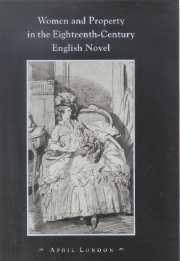Book contents
- Frontmatter
- Contents
- Acknowledgements
- Introduction
- PART I SAMUEL RICHARDSON AND GEORGIC
- PART II PASTORAL
- PART III COMMUNITY AND CONFEDERACY
- Introduction
- 7 Versions of community: William Dodd, Sarah Scott, Clara Reeve
- 8 Confederacies of women: Phebe Gibbes and John Trusler
- PART IV THE POLITICS OF READING
- Epilogue
- Notes
- Bibliography
- Index
8 - Confederacies of women: Phebe Gibbes and John Trusler
Published online by Cambridge University Press: 14 October 2009
- Frontmatter
- Contents
- Acknowledgements
- Introduction
- PART I SAMUEL RICHARDSON AND GEORGIC
- PART II PASTORAL
- PART III COMMUNITY AND CONFEDERACY
- Introduction
- 7 Versions of community: William Dodd, Sarah Scott, Clara Reeve
- 8 Confederacies of women: Phebe Gibbes and John Trusler
- PART IV THE POLITICS OF READING
- Epilogue
- Notes
- Bibliography
- Index
Summary
In their revaluing of the gendered qualities customarily assigned women, both Scott and Reeve deflect attention from questions of sexual difference. This privileging of attributes currently identified with women, but in fact available to men, marks a key thematic distinction between the narratives of community considered in the previous section and those of confederacy to be discussed below. Before turning to the confederacy narratives of Phebe Gibbes and John Trusler, I would like to map out the larger implications of Reeve's and Scott's choice of a gendered over a sexualized economy of social relations. This should clarify the range and extent of the transgressions enacted in the confederacy narratives and suggest some of reasons for their reconfiguration during the revolutionary decade of the 1790s.
The revaluation of gender that Reeve and Scott attempt balances a commitment to enlarging women's opportunities for social engagement against an acceptance of existing hierarchies. Both authors pursue essentialist interpretations – women are, for instance, assumed to be conversable, innately benevolent, and amenable to change. Since such an essentialist reading refers in the main to terms of inwardness, there exists, potentially, a conflict between its values and those of the economic sphere with which the protagonists are also identified through their businesses and philanthropic projects. The conflict is resolved by the suggestion that women's labor has a regulatory agency that draws private and public into concert. Once again, gendered qualities are central to the underwriting of the universal benefits that follow from women's labor.
- Type
- Chapter
- Information
- Women and Property in the Eighteenth-Century English Novel , pp. 124 - 136Publisher: Cambridge University PressPrint publication year: 1999



